Hands Down the Best Way to Kill Weeds and It’s Not Roundup
If you think a homemade weed killer could not possibly be effective, even potent, against weeds, think again! But first, a story …
In 1970, John Franz, a chemist for Monsanto, discovered that glyphosate is a potent herbicide that kills almost every plant material imaginable. In no time, the company gave its miracle weed killer the brand name Roundup.
Farmers, especially, went wild for Roundup. Just one problem: It was nearly impossible to kill the weeds without also killing their crops. So Monsanto sent its chemists back to work to develop glyphosate-resistant, or “Roundup ready crops” that have had their DNA altered (genetically modified or GMO) to allow them to be immune to glyphosate. Now farmers could spray with abandon and not worry about their crops.
To say that glyphosate, Roundup, and GMO foods have become a bit controversial would be, to put it mildly. There are some who say that glyphosate causes cancer in animals, and most likely humans, too. They insist that the side effects of long-term GMO food consumption are producing serious health risks for all living things. Despite all of this controversy and outcry about issues surrounding Roundup and GMO crops, so far the Environmental Protection Agency (EPA) has not forced Roundup off the market. It’s a hot-button issue, that’s for sure.
There is one provable and very compelling reason not to buy Roundup: It’s too expensive! Even if it were proven beyond a shadow of a doubt that Roundup is safe as water, I still wouldn’t shell out the high price for the stuff. I kill weeds like crazy with kitchen pantry items that are really cheap and non-toxic: white vinegar, ordinary table salt, and dishwashing liquid.
First, I will give you the ingredients, followed by two Weed Killer recipes using them. You probably have everything you need around your home, but if not, I’ve linked everything required and made a resources section at the end of the article.
White vinegar
Ordinary distilled white vinegar with a 5% acidity is cheap and works great. If you can find a higher acidity, even up to 20%, it will work faster, but the end results will be the same.
Table salt
Use the cheapest kind of salt you can find in the supermarket—NOT sea salt, rock salt, Epsom salts (Epsom salt, chemically, is not even close to table salt, trust me on that), or anything fancy. Just cheap iodized or un-iodized generic salt, also known as sodium chloride (NaCl).
Dishwashing liquid
You will be using only a few drops, so the brand doesn’t matter. The purpose of the soap is to break the surface tension of the vinegar so it sticks to the weeds, forcing them to absorb it more readily.
Weed Killer for Areas to be Replanted
If you have weeds in areas you want to replant, fill an ordinary garden sprayer with white vinegar and add about one teaspoon liquid dishwashing soap, like Blue Dawn or Meyer’s Clean Day. Apply the sprayer top and follow the instructions on the sprayer to get it ready to spray. That’s it. Seriously, it is that simple.
Pick a hot, dry day to spray weeds until saturated. They will wilt and shrivel up within hours. Be careful not to spray anything you want to live. However, do not worry about the vinegar killing anything below the soil. Because vinegar will not harm the soil, you can safely replant the area once the weeds have died.
Weed Killer for Areas Never to Grow Again
Mix two cups of ordinary table salt with one gallon of white vinegar to kill all vegetation in walkways, driveways, and other areas where you don’t want any living thing to grow again. Do this in a container larger than one gallon capacity so you have room for the salt. Apply the lid and shake to dissolve the salt. Salt dissolves more quickly in vinegar than in water, but it takes a bit of doing. It may not completely dissolve, but that’s okay.
Add 1 teaspoon of liquid dishwashing soap (this is to break the surface tension of the mixture so it will stick to the plant material you’ll be killing). Pour into an ordinary garden sprayer. Apply to weeds or grass on a dry, sunny day to areas you don’t want to see vegetation of any kind in the future.
The presence of salt in this recipe will eventually bring permanence to your weed killing. The salt will penetrate and leach into the soil. It may take several applications, but in time, the presence of salt will “sterilize” the soil in this area so that nothing will grow there. Plan well before you go this permanent route.
Non-toxic to Humans, Pets
These homemade weed killer recipes are not only cheap but also completely non-toxic to humans and animals. In fact, except for the soap (not toxic but not very tasty), you could have fun with the family tonight when you tell them you made the salad vinaigrette using 3 parts olive oil to 1 part weed killer!
Resources
As mentioned earlier, you likely already have everything you need for this fantastic weed killer. If not, I’ve created this Amazon resource list for your convenience, reference purposes, and to provide additional information and options.
Everyday Cheapskate participates in the Amazon Services LLC Associates Program, an affiliate advertising program designed to provide a means for us to earn from qualifying purchases at no cost to you.
More from Everyday Cheapskate
Please keep your comments positive, encouraging, helpful, brief,
and on-topic in keeping with EC Commenting Guidelines
Last update on 2024-05-04 / Affiliate links / Images from Amazon Product Advertising API

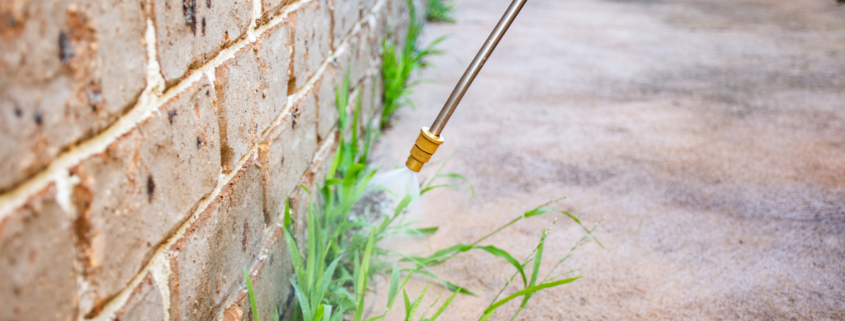







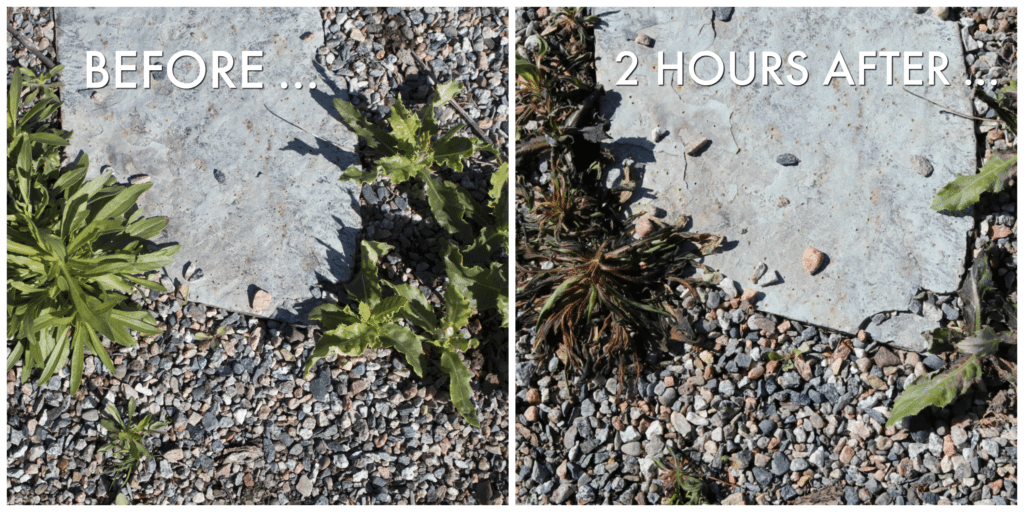








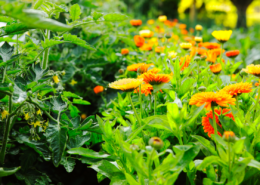
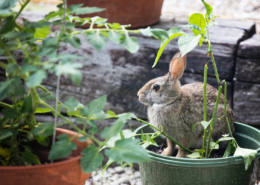
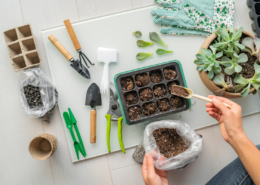
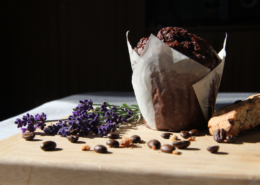




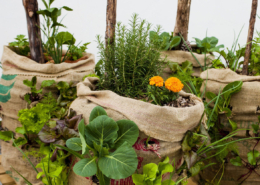


I love RoundUPP… !! It’s my goat’s name.
Round-up is a DNA disruptor. Does it really matter how much a little vinegar costs by comparison?
It actually is not a DNA disruptor. Where on earth do people get these ideas?
It’s on the web. Lawsuits are won by lawyers$$$$. It must be true!
Science? Who needs science when we have madeup bs.
Roundup, when used as directed, is safe and works no matter what the fear people say.
BTW, it does NOT kill ivy, star jasmine, vinca major and a few other waxy leaved plants.
This is interesting i have also seen something similar here http://diysomo.com/index.php/2017/06/27/get-rid-of-garden-weed-organically/
I agree with the people who advise against using common table salt (sodium chloride) as a weed killer. From personal experience, it killed the weeds in my sidewalk cracks, but it also adversely affected any of the plants which had roots in the area, including several large specimen trees. It seemed to have been a very poor decision, and it did, in my case, leave the otherwise fertile soil unusable. Just stating my experience; people who like talking snarky-tough about tree-huggers can save their comments for someone who cares.
I also agree with the people who suggest that a lot can be gained (and a lot of work avoided) by reassessing what you regard as a weed or not. It’s especially puzzling when people “pull a weed”, even if they don’t know what it is. It might be more interesting or valuable than the plant you’re trying to grow. Or it might attract pollinators or parasitic wasps to benefit the other plants. Best (and more thoughtful) to identify the plant first, before killing it.
There are numerous definitions of a weed, including: a plant out of place and not intentionally sown; a plant growing where it is not wanted.
From the company that brought you Agent Orange, “Round UP”
Facts, please. Dow Chemical, Not Monsanto, developed Agent Orange.
Well… Technically the formula was developed by a team at the U of Chicago, but the supplier/manufacturer for the US Army was Dow
Yes facts please indeed, Dow Chemical did not develop agent orange, the US army did. Dow, Monsanto and others were contracted to mass produce it and had to give that contract priority in virtue of the Defense Production act of 1950
Dow Chemical and Monsanto were the two largest producers of Agent Orange for the U.S. military, and were named in the suit, along with the dozens of other companies (Diamond Shamrock, Uniroyal, Thompson Chemicals, Hercules, etc.).
Is this a UK gallon, or a USA gallon please?
It’s an Asian gallon.
Through all of this discussion, nobody ever gave the proportions of the landscape vinegar (I bought 30%) to water, salt, dish detergent. I would guess that strong vinegar should be cut with water????
Everyone is so negative about everything. What has happened to common sense. Too much round, too much salt or too much vinegar. The thing is about round up a very little with deiscretion and common sense goes a long way and is more effective than any other trick or old wives recepies out there. Just use it very carefully.
i have used concentrated round -up..followed the directions, even added a lil extra per gallon.kills them for a bit ,but keep coming back.now i just lay down dark rubber tarps where i want vegetation killed….nothing survives without light and water
Great tip, Jeff. Thanks for sharing it!
Works very well on dandelions and bindweed and whitetops.
Yep, Roundup works on most everything but can’t use in the lawn unless extremely careful and precise.
I use Roundup and / or vinegar. For bindweed Quinclorac.
So far, Roundup has been my only effective solution for bindweed and whitetops. I do not wish to saturate the soil with salt, making all growth impossible forever. I just want to kill the weed and its roots, and be able to replant. Roundup is the only thing that works for that. Roundup Ready Crops? No thank you!!
No worries about that salt will not make growth impossible forever. I used a bag of pool salt on my yard trying to kill everything growing . Worked for about 6 months. how ever it did not kill the Kudzu.
Kudzu – the plant that ate the South. 🙂
Kudzu, LOL. that’s stuff is a plague. My father told me the only way to kill that stuff is to pour gasoline on it and light a match.
The whole point of using natural substances is to avoid products like Roundup to begin with. The toxicity level alone should scare you.